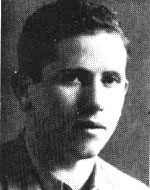Yitzhaki, Arie (“Gondar Aryeh”)
Son of Deborah and Elijah. He was born in the winter of 1914 in Kalisz, Poland, and when he was ten years old, his family immigrated to Eretz Israel and settled in Jaffa, where he joined the “Tachkemoni” school in Tel Aviv. Despite his youth he joined the Haganah and after the establishment of the Irgun Zvai Leumi, he moved to his ranks. At the end of 1936, with the opening of the Tel Aviv port, Aryeh, who was a plumber by profession, donated the knowledge and professional experience he had acquired for himself. He was also among the first to break the restraint. At the beginning of 1937 he went with another commander of his underground comrades, both on a motorcycle, to the village of Yasur and dropped a bomb at an Arab coffee shop. The next day, they were ordered to be sent to the other organization, but a few weeks later the division of April 1937 took place and they returned to the new organization. The attack on an Arab bus on the Ramle-Jaffa road, the leaving of a bomb in the Lev of the market in Jaffa, the attack on the village of the rioters Selma, the leaving of mines under railroad tracks, the explosion of telephone lines, etc. In 1939 he went to Poland to take part in a military course for senior Irgun commanders. Upon his return to Israel, he devoted himself mainly to the development of the department that manufactures explosives. On August 5, 1939, when a bomb was detonated, the bomb exploded in his hands. When the British detectives arrived at the house on Lilienblum Street, the site of the explosion, he found him blind in both eyes, one hand cut short and the other smashed and seriously wounded in the chest. To the question of his name he answered: “My name is death!” He was transferred to Hadassah Hospital. There, too, the British did not let go of him and did not stop interrogating him, but they saved him nothing. On the following day, on the 6th of Av 5739 (6.8.1939), he died of his wounds and was laid to rest in the cemetery in Nahalat Yitzhak. The chapter of his life and activity was detailed in “Memories of Netzach,” a memorial book for the heroes of the Irgun Zvai Leumi, and his memory was commemorated in other publications.
